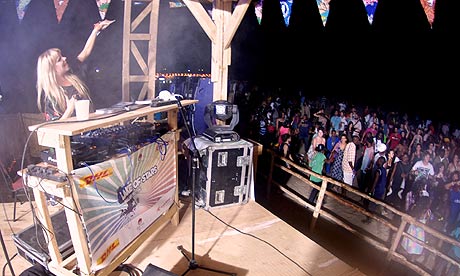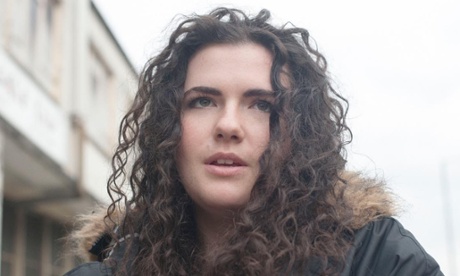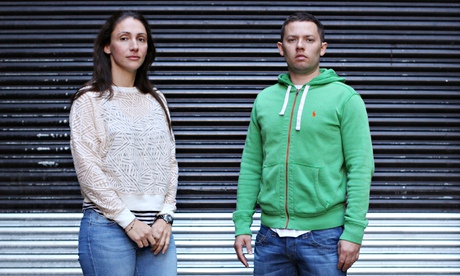It's morning in Malawi and, as the temperature reaches 90 in the shade, DJ Goldierocks is bringing a taste of British underground music to the bemused listeners of youth station Power 101 FM. It's been a gruelling journey that began on the Tube in east London and ended, four flights and 36 hours later, in a bumpy drive through the colourful shanty towns that line the road to Blantyre. But the 27-year-old London DJ, real name Sam Hall, is in fine spirits.
It's fair to say FM 101 Power listeners are less than familiar with the tunes in Hall's radio show; Django Django, Kyla La Grange and Instra:Mental are hardly household names in Malawi. But this is her job: bringing cutting-edge music from the British underground to rest of the world.
Hall, a sometime Radio 1 presenter and familiar face at UK club nights and festivals, hosts The Selector, a weekly two-hour radio show that has been heard (and heard of) by only a handful of listeners to NME's digital radio station. Outside the UK, the show, which celebrates its 10th anniversary this year, has an audience of more than 3 million listeners in 34 countries.
The Selector is part of an outreach programme by the British Council, and the show's role – funded to the tune of £50,000 by the government – is to spread underground music all over the world. Its playlist favours cutting-edge artists such as Race Horses, Bastille and Airship, Breton, Lossy and Still Corners – UK artists unfamiliar even at home. They can come from any genre of music, just so long as they are British.
"In a lot of the places I've visited, they're not only new to the tunes I'm playing, but they've never heard of grime and dubstep," Hall says over a bottle of Sobo, a soft drink to which she has become attached from previous visits to Africa. "But what I've found is that, although there can be initial resistance to unfamiliar sounds, they are eager to embrace new genres. And that's my job: to bring British street culture to the rest of the world."
In addition to the weekly show – featuring an hour of music chosen by Hall and a club mix by a guest DJ – The Selector gets out and about to spread the word once every couple of months at the stations that subscribe, often with unpredictable results. A launch party in Mexico City not only sold out, but resulted in invitations to play live for two of the show's featured bands: Dinosaur Pile-Up who drew a crowd of 3,500, and the Boxer Rebellion, who are going back for a festival date.
Meanwhile, listeners in the far east have taken so much to Jamie Woon that he is now a staple of radio playlists in Kazakhstan, and has been booked for a four-month stint as an artist-in-residence in Xi'an, China, next year.
It's the same story in other countries although, as Hall says, it's never easy to predict what will work where. "And that's why we play such a diverse range of music on the show," she explains. "Some places go for dubstep or grime, even if they didn't know it before, and others might prefer folk or rock or electronica."
Trends have begun to emerge. "I've noticed in the former Soviet republics, such as Ukraine, they like hard, minimalist techno," she says, "while Vietnam seems to have a taste for experimental electronica – even on the government station."
The only drawback to today's broadcast from Malawi is that FM 101 Power has mistakenly played a two-week-old show. So Hall is broadcasting about Bestival, on the Isle of Wight, rather than the Lake of Stars festival, to which we are driving the next day. Nevertheless, Hall's visit is judged such a success by manager Oscar Thompson – who started the station by buying a transmitter in west London after the deregulation of radio in Malawi 13 years ago – that he decides on the spot to move The Selector to Saturday night.
There's further confusion after the show at a local nightclub, the Twiga Lounge, hidden in a deserted mini-mall off a dual carriageway near the national football stadium. The British Council's local liaison officer, Patience, who is more accustomed to shepherding visiting dignitaries around schools, has booked Hall to give a press conference, host a workshop with local musicians, and do a DJ set the same evening.
The first journalist, sweltering in a suit and tie, arrives half an hour late and declares that it is too hot to talk outdoors, forcing us out of the midday sun and into the dingy nightclub. The second arrives a few minutes later. There is no third to hear Hall explain how she's trying to "build a global community wth a passion for new British music".
Hall's DJ set has been advertised heavily by FM 101 Power and she's supposed to hit the decks at 8pm, but there are only three people there when we arrive at the club. Two hours later the crowd has finally reached double figures – most of them waiting for the pool table – and Hall finally gets to play. She's used to crowds hitting the dancefloor with their hands in the air, but she would be the first to admit this is not her greatest triumph.
Early next morning, we're crammed on a sweltering bus for the four-hour journey to what is surely the world's most spectacular music festival.
Lake of Stars was created eight years ago by British duo Will Jameson and Tom Porter, and this year's festival features some of Malawi's biggest names: national legend Lucius Banda, reggae giants Black Missionaries and rising urban star Maskal. Also there are British indie favourites Foals, soul singer Beverley Knight – both waiving their usual fees – and a roll call of musicians and DJs from Malawi, South Africa, Kenya, Namibia, Rwanda, Japan, China, France and Sweden.
Room sharing is mandatory for artists and punters alike, so Hall is shacked up with Radio1Xtra DJ and TV presenter Gemma Cairney. The schedule turns out to run on what is referred to as "Malawi time", an increasingly flexible concept in which almost anything can happen.
Every time Cairney is told to take over the decks she finds someone else already there, before she finally finds a slot, while Hall's 4am sunrise billing on Saturday morning is mysteriously transferred at the last minute to Sunday, with a second set pencilled in elsewhere.
We're all warming up for the heavily hyped Black Missionaries headline slot by watching a storming set from Malawian-Swedish duo the Very Best, supplemented by six dancers, when bad news arrives. We hear, on the grapevine, that the Missionaries are still half an hour away, that one of their members has gone missing, that there has been a dispute over money and, finally, that they will now play tomorrow night instead.
Unfortunately the grapevine does not extend to the crowd themselves, drawn half from Malawi, and the rest made up of South Africans and British expats from non-governmental organisations in neighbouring countries. In an attempt to fill the gap, Hall is asked if she can step in to headline the main stage instead. But that plan is scuppered because her records and DJ kit are locked in her room, and Cairney, letting her hair down after her own set, has disappeared with the key.
Next day the Missionaries finally get to play, at around 2.30am, after more schedule changes. And on Sunday, after an excursion to a micro-loan project in a nearby village, Hall finally gets to close the festival.
There's time for just a couple of hours' sleep before the long journey back to the capital, Lilongwe, for the flight home. The Foals minibus manages to make it despite the driver hitting and killing a goat on the road, a bird smashing the windscreen, and a near miss with a small child. But the ride is spectacular: villagers rising at dawn then carrying their modest wares in vast containers on their heads to set up roadside stalls while small children clamber up mountainsides for school wearing immaculate uniforms.
At the small international airport, Hall frets about having to present this week's show within hours of arriving home after a journey of more than 24 hours. She rests up with a swollen knee – sustained crowdsurfing at another festival – and a fever, worrying she has contracted malaria. The flight, inevitably, is delayed by several hours, but Foals break out the beers at the outdoor departure lounge and all is right with the world.
It is, everyone agrees, a successful international mission for Brand UK.
The Selector can be heard on NME Radio at 6pm every Friday, and any time at selector-radio.com.








